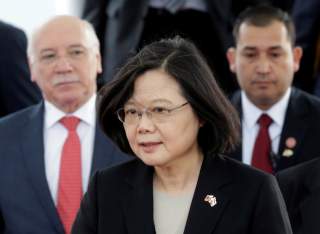What Comes Next After Taiwan's Elections?
Will the DPP get its act together or will it divide, giving the KMT a better shot at the presidency?
From the outset, Beijing had signaled its intention of ensuring that Tsai would be a one-term president. Now a splintered party and divided political map penetrated by China certainly seem dire for Tsai, who will need to find ways to keep the party together, better connect with Taiwanese voters, and appoint government officials who are better at implementing—and communicating—policy. The prospects of her removal are rather alarming, as they could derail the successful balancing act the Tsai administration has performed on the external front, one which has allowed Taiwan to deepen its engagement with important democracies amid greater pressure by Beijing to isolate Taiwan. A less careful leader would likely cause apprehensions in foreign capitals and create more incentives to avoid dealing with Taiwan lest this compromise their ties with Beijing.
For the time being, the KMT’s successes in the November 24 elections has re-energized a party that, not long ago, had seemed unable to get back on its feet. It remains to be seen whether that new momentum will lead to the rejuvenation that is much-needed if the party is to regain its appeal at the level of national politics. For example, the KMT continues to be led by the old guard; young up-and-coming politicians and future leaders are conspicuous by their absence. Moreover, the mainlander-versus-Taiwanese factions remain self-defeating, which bodes rather ill for the current party chairman, Wu Den-yih, whose position atop the party is now the object of jealous machinations.
Essentially, this was primarily a local readjustment, one it would be unhelpful to read too much into as China’s TAO certainly did, with the claim that the vote reflected “the Taiwan people’s high hopes for peaceful development in cross-strait relations.” From its experiences during the Ma administration (2008-2016), the KMT has learned—or should have learned—that getting too close to China will cost the party dearly, both in elections and in the actions of an alert civil society. And the public, short though its memory may be, could well be reminded that the promise of fortunes through closer engagement with Beijing is but an illusion, and a politically dangerous one at that. Whatever the election results tell us, Taiwan did not suddenly turn “pro-China” with its recent elections.
J. Michael Cole is a Taipei-based senior fellow with the China Policy Institute/Taiwan Studies Program at the University of Nottingham, UK, an associate researcher with the French Center for Research on Contemporary China, assistant coordinator for the Forum 2000’s China Working Group, and chief editor of Taiwan Sentinel. Image: Reuters

